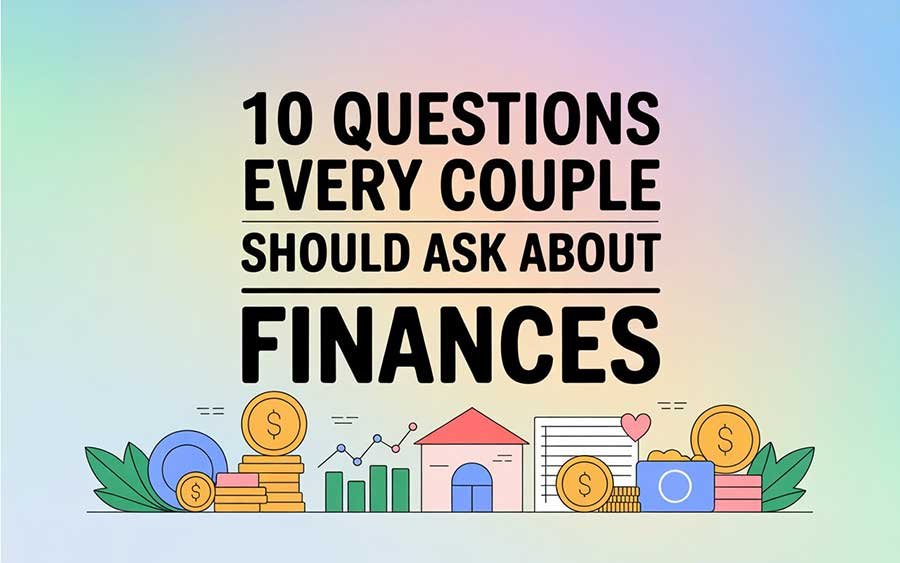
10 Questions Every Couple Should Ask About Finances
Money is one of the leading causes of stress in relationships. Whether you’re newly dating, engaged, or have been married for years, having open, honest conversations about finances is one of the best ways to build trust, avoid conflict, and plan a future that works for both of you.

But where do you start? This guide walks you through 10 essential financial questions every couple should ask, along with real-life examples and tips to help navigate each conversation.
Why Financial Conversations Matter in Relationships
Money impacts everything from daily choices to major life goals. Avoiding money talk can lead to misunderstandings, resentment, or hidden financial issues. Talking about finances together:
- Builds transparency and trust
- Uncovers financial habits and goals
- Creates a shared vision for the future
- Helps prevent arguments and surprises
Financial intimacy is just as important as emotional and physical intimacy.
Question 1: What Are Your Financial Goals (Short- and Long-Term)?
Understanding each other’s goals is the foundation of financial teamwork.
Ask:
- What do you want to accomplish financially in the next year?
- What are your dreams for the next 10 or 20 years?
Real-Life Example:
Ashley wanted to travel more, while Jason prioritized saving for a home. Once they talked it through, they created a dual savings plan: one for travel and one for a future home.
Question 2: What Does Financial Security Mean to You?
“Security” can mean different things: an emergency fund, being debt-free, or owning a home.
Ask:
- What makes you feel financially safe?
- What worries you the most about money?
Real-Life Example:
David felt secure with a large savings buffer, while his partner Molly prioritized paying off student loans. Understanding their definitions of “security” helped them compromise and build both savings and debt payoff into their budget.
Question 3: How Do You Handle Budgeting and Spending?
It’s common for one partner to be a saver and the other a spender.
Ask:
- Do you follow a budget?
- How do you track spending?
- Are you more impulsive or frugal with purchases?
Real-Life Example:
Samantha used spreadsheets to track every penny. Mike didn’t budget at all. They agreed to try a budgeting app together, making it easier for Mike to get on board.
Question 4: What Debts Do You Have?
This includes credit cards, student loans, auto loans, medical bills, or any personal debt.
Ask:
- How much debt are you carrying?
- What are the interest rates and payment plans?
- What’s your plan for paying them off?
Being open about debt prevents future surprises and helps couples support each other.
Question 5: What Is Your Credit Score and Credit History?
Credit affects your ability to get loans, rent homes, or secure good interest rates.
Ask:
- Do you know your credit score?
- Have you had any major credit issues in the past?
- What steps are you taking to maintain or improve your score?
Knowing this information early helps avoid conflicts when big purchases like homes or cars are on the table.
Question 6: How Do You Feel About Combining Finances?
Every couple handles money differently. Some merge all their accounts, others keep everything separate, and many choose a hybrid model.
Ask:
- Do you want joint or separate accounts?
- How should we handle shared expenses?
- What feels fair to both of us?
Real-Life Example:
Emily and Ben kept separate checking accounts but created a joint account for rent, bills, and groceries. It worked because they communicated clearly and contributed based on income percentage.
Question 7: How Should We Divide Financial Responsibilities?
Dividing up who handles what can reduce stress and improve teamwork.
Ask:
- Who will manage the budget?
- Who will pay the bills?
- Will we review finances monthly together?
Real-Life Example:
Ryan took care of bill payments while Jenna handled long-term planning and investments. They met monthly to review and adjust as needed.
Question 8: What Are Your Spending Triggers?
Understanding emotional spending helps you support each other and avoid conflict.
Ask:
- When are you most likely to overspend?
- Are there specific categories that are hard for you to resist?
- What helps you stay disciplined?
Real-Life Example:
Daniel tended to overspend on tech gadgets when he was stressed. His partner helped him set limits and use a “48-hour rule” before big purchases.
Question 9: How Do You Feel About Saving and Investing?
Different risk tolerances can affect how you save and invest together.
Ask:
- Do you prefer saving cash or investing in the stock market?
- Are you comfortable with investment risk?
- What does retirement planning look like for you?
Real-Life Example:
Natalie loved saving in high-yield accounts, while her partner loved investing in ETFs. They split their monthly savings to satisfy both comfort levels.
Question 10: What Financial Legacy Do You Want to Leave?
Even in your 20s or 30s, it’s worth talking about the future.
Ask:
- Do you want to leave money to kids or causes?
- How do you feel about life insurance or estate planning?
- Are there values you want to pass down through money?
Talking about legacy helps build purpose into your financial decisions.
Final Thoughts: Talk Now, Thrive Later
The couples who talk openly about money don’t just avoid fights — they grow stronger together. These 10 questions aren’t just for one conversation. Revisit them regularly as your life, income, and goals evolve.
Money can be a source of unity, not tension. All it takes is honesty, curiosity, and the courage to begin the conversation.
20 Quotes to Inspire Financial Conversations in Relationships
- “A strong relationship requires choosing to love each other, even in those moments when you struggle to like each other.” — Unknown
- “Love is not just about how you feel, but how you deal.” — Unknown
- “The best thing to spend on your relationship is time, communication, and honesty.” — Unknown
- “Money can be the best servant or the worst master in relationships.” — Unknown
- “True love doesn’t hide finances.” — Unknown
- “In marriage, it’s not about your money or my money, it’s about our money.” — Dave Ramsey
- “Talking about money is one of the most loving things you can do.” — Suze Orman
- “The goal of communication is connection, not control.” — Unknown
- “The earlier couples talk about money, the better their financial future together.” — Unknown
- “Money issues are rarely about money. They’re about trust, values, and respect.” — Unknown
- “Don’t marry someone you wouldn’t want to be in debt with.” — Unknown
- “Financial transparency is the foundation of financial intimacy.” — Unknown
- “Budgeting together is better than arguing later.” — Unknown
- “Money reveals priorities. Talk about them.” — Unknown
- “Being financially compatible is just as important as being emotionally compatible.” — Unknown
- “Love is an open door, and so is your financial plan.” — Unknown
- “Trust is built when you share your numbers and your goals.” — Unknown
- “A financially healthy couple is an emotionally strong couple.” — Unknown
- “Working together financially means growing together in life.” — Unknown
- “Your future together depends on the decisions you make today.” — Unknown
📸 Picture This
Imagine sitting on the couch with your partner, coffee in hand, having the most honest and loving conversation you’ve ever had about your future. You talk about dreams, fears, goals, and money with openness and trust.
There are no secrets, no blame, no stress. Just two people choosing to face life’s challenges as a team. Your finances become a source of unity instead of division.
What would your relationship look like if money became a bridge, not a barrier?
📢 Please Share This Article
If this article helped you start an honest conversation or gave you clarity, please share it with someone who might benefit from it too. The more couples talk about money, the stronger they grow.
⚠️ Disclaimer
This article is for informational purposes only and is based on personal experience and research. It does not constitute financial or relationship advice. Always consult with a qualified professional for your specific situation. We disclaim all responsibility for actions taken based on this content.






